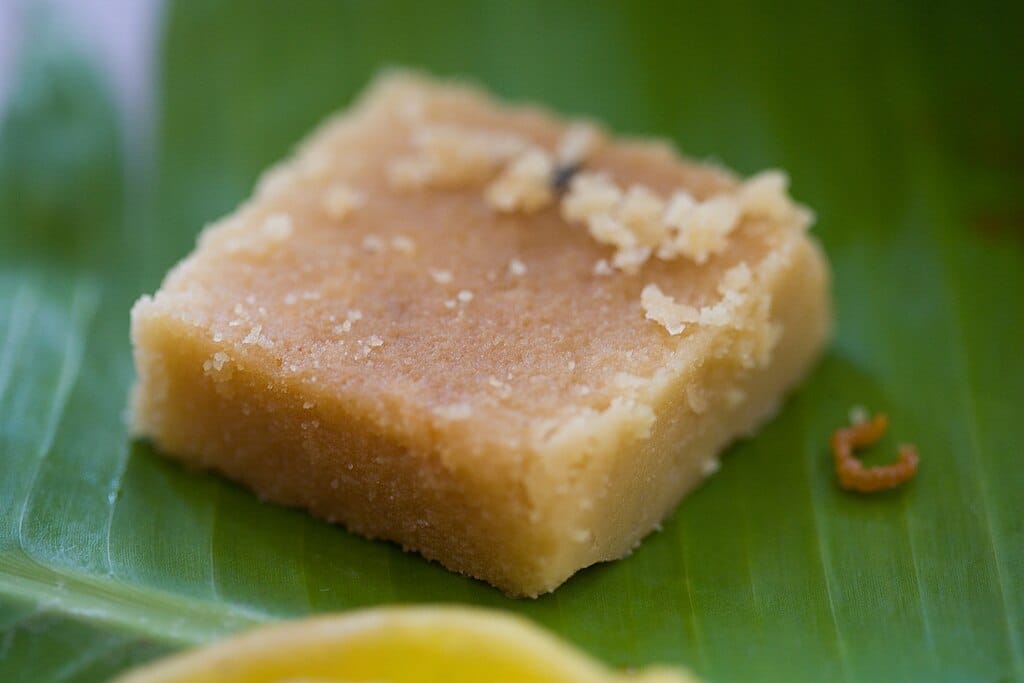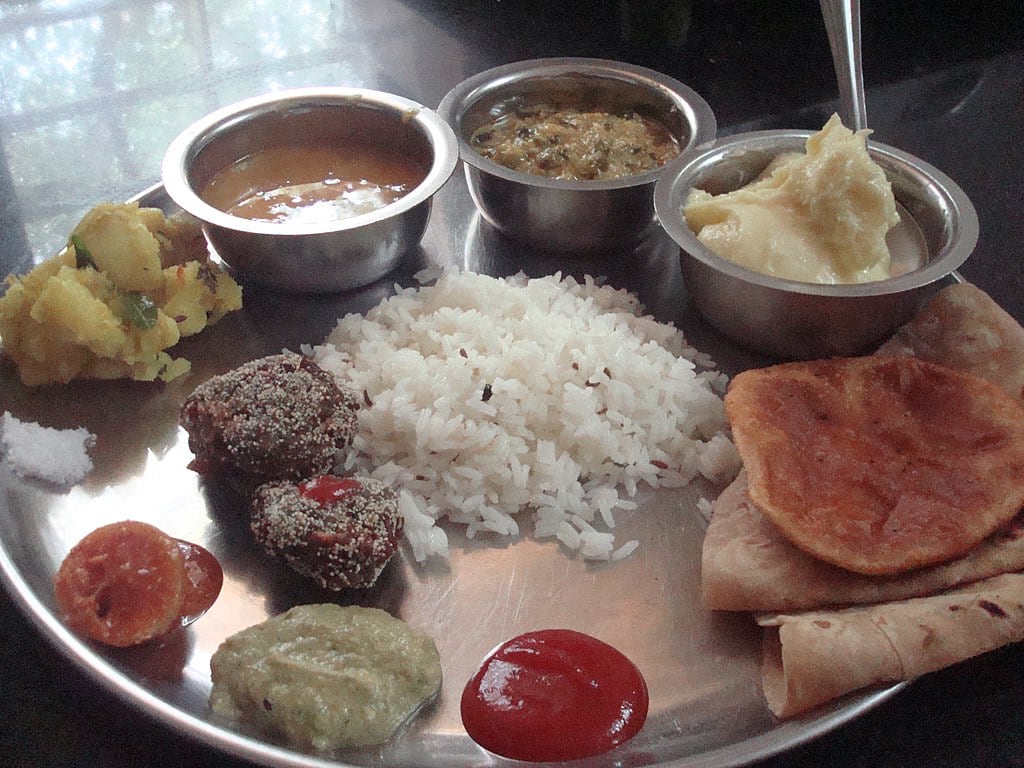



Across India, Dussehra, which symbolises the victory of good over evil, is considered an auspicious day to embark upon new ventures and is celebrated with pomp and splendour — from Ram-Leela events, burning of effigies of Ravana to welcoming the Goddess at Durga Pujo. After nine days of fasting, food naturally, occupies a special significance and every part of India, eats a specific dish or several food items to commemorate this day.
North India
In many homes, on Dussehra, kale chhole (black chana) and jalebis are a must, as the family has been adhering to this tradition for generations, with a view to providing protein and essential nutrients to the body after the period of fasting, while jalebi becomes the celebratory sweet.
 Jalebis being fried (Photo by Biswarup Ganguly via Wikimedia Commons 3.0)
Jalebis being fried (Photo by Biswarup Ganguly via Wikimedia Commons 3.0)
Chef Radhika Khandelwal of Fig & Maple, Goa, who hails from north India, emphasises the importance of certain foods and ingredients during Dussehra, owing to seasonal changes. “Traditional dishes prepared and consumed during Dussehra are characterized by the use of ingredients that either offer warmth or possess immune-boosting properties, aligning with the season.”
She further adds, “Paan or betel leaf, is significant. It is prepared by wrapping a mixture of areca nut, slaked lime, catechu, and various flavourings in a betel leaf. It is consumed as a digestive aid and mouth-freshener after meals, particularly during festivities. Additionally, jaggery is a common ingredient used in Dussehra recipes. It is known for its natural cleansing properties and is often combined with curd (yogurt) as a traditional practice during Dussehra. This not only replenishes energy levels, but also has a soothing effect on frazzled nerves, making it an ideal choice during this festive season.”
Southern India
In Karnataka, as in several parts of India, people are typically vegetarian for the Navratri period. Vegetarian food thus becomes the focus on Dasara too. According to Chef Mandaar Sukhtankar, corporate chef, Total Environment Hospitality, which runs Oota Bengaluru, during Dasara/Navaratri many people are vegetarian and hence dishes like kosambri (lentil salad), vade/ambode (fritters), different types of rice, palya, gojju, chutneys, and desserts are preferred. With festivities being centred around south Karnataka, sweets like Mysore Pak, various types of payasas and holige are eaten, as most of the ingredients are locally available.
 Mysore Pak (Photo by Charles Haynes via Wikimedia Commons 2.0)
Mysore Pak (Photo by Charles Haynes via Wikimedia Commons 2.0)
He further explains, “Different communities celebrate Dasara differently. Savjis, who claim descent from the mythical thousand-armed warrior King Kartiveerya Arjun, are a martial community who belong to SSK (Somavamsha Sahasrarjuna Kshatriya) Samaj and inhabit central and south Karnataka, besides parts of Andhra and Maharashtra. During Dasara, they prepare yedmi (masala puri), mutton and chicken curry (in green or red masala), mutton chops, spicy karadu mutton, tale mamsa (brain fry or bheja), kaima unde (meat balls) and khara boti. Another interesting ritual, in this part of the country, is the offering of laal pani (alcohol) to their tutelary deity Goddess Durga.
Huli Thovve, a gravy-based dish, made with sweet pumpkin or even a ridge gourd, is equally popular across Karnataka for Dasara as these vegetables abound in this season. “Jaggery, tur daal and tamarind, are added to the pumpkin, impart a balance of flavours. This sweetish, piquant dish is eaten with rice in most homes,” says Vaishnavi Hegde, a Bengaluru-based homemaker.
Eastern India
Tiny crisp-fried, diamond-shaped maida bites – kucho nimki, are associated with Dusshera in Bengal, even though there is no religious significance. Navi Mumbai-based, Food writer & Blogger of Not out of the Box, Chandrima Sarkar, says, “After bidding adieu to the beloved Goddess on Bijoya, we wish ‘Subho Bijoya’ to each other. There is a ritual of exchanging sweets and savouries between neighbours and loved ones. And for this, ladies in every Bengali home prepare Kucho nimki, Elo jhelo, Naru (jaggery-coconut laddoo), chhanch sandesh (chhena or coconut fudge). These preparations typically start a day before Bijoya Dashami, so that when the guests visit, they then can be served these.”
Ma Durga is also appeased with a ‘bhog’ of fish on the final day and this prasad is then consumed by families at home. It is typically a silver Hilsa or rohu, that is eaten in a curry or fried form.
In southern Bihar, now Jharkhand, Bengal’s influence is palpable, and to quash Ma Durga’s anger on Navami, the ninth day, a goat is sacrificed and offered as ‘bhog’. This meat is then consumed by people in their homes and considered partaking of a divine meal on Dashami, says Chef Nishant Choubey.
Western India
No Dusshera celebrations in Gujarat are complete without a traditional breakfast of sweet jalebi and gramflour fafda. Chef Prashant Tikadia, says, “It is believed that Lord Ram, relished a sweet called Shashkhuli which resembles the modern-day Jalebi and hence it is considered auspicious to start your day on Dusshera with this. To balance the sweet elements, fafda, is a popular choice, as, made with besan, it is considered to be healthy and easier to digest, after nine days of fasting.”
Kadakani or Devicha fulora (deep-fried sweet puris made with maida, sooji and powdered sugar), are typically offered as a Naivedya or Bhog for Devi Ma (goddess) during Navratri in Maharashtra and is thus eaten on Dusshera.
According to food researcher Chinmay Damle, Vijaya Dashami, generally known as “Dasara”, the tenth or the last day, was one of the principal festivals in Pune in the Peshwas’ times. Goddess Durga or Bhavani, being the revered object of devotion of the Bhonsle family “Dasara” was celebrated as a state function in Satara till the death of Raja Shahu, after which Balaji Bajirao commenced to hold its annual gathering at Pune with equal grandeur and pomp.
He adds, “Most households in Maharashtra, nowadays, cook a vegetarian meal of Basundi-Puri, Shrikhand-Puri, or Puranpoli. There has been a large homogenisation in terms of culinary traditions in Maharashtra. Till the better part of the last century, certain castes slaughtered an animal, either at home or in temples, on the occasion of Dasara. However, the public slaughtering of an animal is rarely carried out any more.”
 Thali with Shrikhand for dessert. (Photo by Dharmadhyaksha via Wikimedia Commons 4.0)
Thali with Shrikhand for dessert. (Photo by Dharmadhyaksha via Wikimedia Commons 4.0)
Steamed rice noodles, dipped in sweetened coconut milk or Shirvolyo or Shevyo, is a sweet typically served on all auspicious occasions and festivals in Goan homes. Dusshera, being a popular Hindu festival, this dish makes its presence felt in most homes to commemorate the celebrations.
Discover the latest Business News, Sensex, and Nifty updates. Obtain Personal Finance insights, tax queries, and expert opinions on Moneycontrol or download the Moneycontrol App to stay updated!
Find the best of Al News in one place, specially curated for you every weekend.
Stay on top of the latest tech trends and biggest startup news.